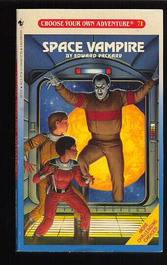 Like many, I grew up with Choose Your Own Adventure novels. I have fond memories of all the different types of adventures. There were scifi and fantasy adventures, as well as books licensed for certain intellectual properties. I gravitated towards the ones that were a D&D or Zork style dungeon crawl, but I admit to remembering I had a fondness for a Gamma World tie in that I can remember only the cover of; that cover was epic to the younger version of me. I'm not sure if the appeal of Choose Your Own Adventures were reader choice and a changing story, or the fact that there was little else that was scifi or fantasy available for that younger reading level. I just knew I read many of them before I was mature enough to read adult scifi and fantasy. It's interesting that all these years later, the thing I remember most from them are the endings. Not even the "true" endings you would get from making all or most of the right choices and seeing the story through to the end. I remember the "bad" endings, the ones you got when you made the wrong choices and the story ended early. These bad endings were at best a page long and often just a few short paragraphs followed by THE END. If you had not been cheating and holding your finger to mark the page where you had just come from, you were left without a page number reference and you'd have to start the whole thing over. 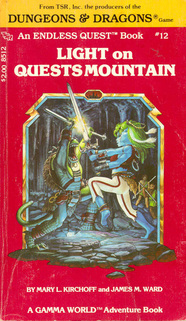 This picture is awesome when you're 8 years old. This picture is awesome when you're 8 years old. What interests me most about some of these bad endings was their ways of changing or subverting the plot. If you successfully completed the Choose Your Own Adventure, you'd get a story about thwarting some evil, often an evil sorcerer, evil presence, evil computer, etc. Basic clichés for a basic story. What interests me now is how some bad endings changed that. You would assume that if you got an ending earlier on, it would keep to the same core narrative, and it would be about how that main plot evil won; you were killed by the sorcerer, minions of the evil computer, the evil presence caught you defenseless, etc. There are some Choose Your Own Adventure books that followed this, but some that didn't. In the ones that didn't follow this, what you got is a complete change from the reality of the main narrative. For example, say you're in a Choose Your Own Adventure where you are entering the castle of the evil sorcerer. In this one you're entering the castle with your trusted ally. Then you choose poorly. What may happen is that your abrupt ending is about getting killed by your trusted companion who is actually evil. But if you follow the main story to a true ending, that companion really is completely trustable, he's not a traitor like in the early ending. In this bad ending, the nature of the story has been changed; a character is completely different than in the approved storyline. In other bad endings you might find things like the sorcerer doesn't exist and it's really a sentient tower that eats people, that the cause of evil is really the feared lizard people who just killed you, or the even more dreaded ending where it was all just a bad dream. 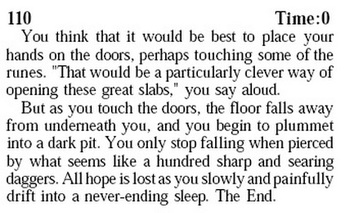 While when I first thought of this as just interesting, it became stranger the longer I thought about it. If you or I thought about writing these, our first thought would be to create a demise for the reader consistent with the true ending, i.e. the narrative of what was "really" going on. We'd make the evil sorcerer have killed you early, rather than thought of a completely different way for you to die that clashes with the main ending. Yet these authors did not do the obvious. Bad endings are a mutation, almost a subversion, of what the book's reality supposedly is according to those true endings. In each of those bad endings, the book's reality was changed to something else. So what is this really, aside from the strangest kid-friendly game of Betrayal At the House On the Hill Ever? It's a fascinating way to play with expectations. It covers up any spoilers for the true endings. It allows the belabored authors a chance to use other ideas, particularly ones that they didn't flesh out well. It also allows them to casually dick over the readers (screw you "it was just a dream" endings!). But it also raised a generation to understand the reality and truth of a story differently than previous generations. If what was going on could change in a Choose Your Own Adventure with just a different selection of pages, did that true ending really happen? Was it anymore likely? What did consistency really mean for a story? 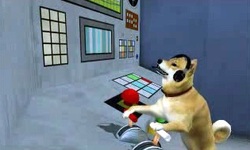 So what does this all mean? Is the fact that Choose Your Own Adventures had this level of interactive reality significant? The problem is that even if it is significant, not every medium can take advantage of it. A non-Choose Your Own Adventure had no reader interactivity. Like a movie, the reader is a passive participant, a mute audience. Their choices are only to continue on or stop reading. No matter how much they will it, no matter the invective they subject the protagonists to, no matter how much rotten fruit is applied to page or kindle, the book will never do anything different. There is but one reality, one story, and that's it. However, there is one modern medium where there is interactivity, and that is video games. Choose Your Own Adventures were popular in an era before video games truly became popular. What video games that did exist did not focus on narrative choice. Their interactivity was limited in scope to a choice that affected moment to moment, never any choices that affected long term, other than a selection of class which meant strategies changed. But choices in games that actually changed the story came later. However, even when video game choice did show up, it was not so malleable as Choose Your Own Adventures. In a video game where player choice affects the ending, it does so in small ways. The narrative reality is consistent - the villain and what he is doing stays consistent no matter the player choice. If they choose something else, his nature does not change. While some of this I know is related to limited production resources, I think another is related to how story narrative is viewed. There is one true story, and video game choices are just mitigating flow to this ending. The choices don't change the nature of the story. Outside a few exceptions that are often bizarre (Hello, Silent Hill Dog Ending), games may have choices, but they don't change the nature of a story's reality like a Choose Your Own Adventure. 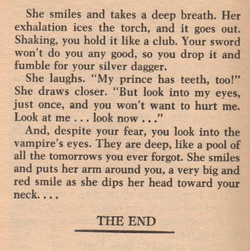 Will we see more of this in the future? It's hard to say. Many video games are overbudget, underfunded, rushed, or might find it completely unfeasible to change things based on player decision. While a murder mystery could have a randomized murderer, I am speaking of a change to things more than just a simple change of identity. Procedurally generated games may have more of an opportunity for this, but do they lose some of the finer points of story writing in the randomized madlibs design? Who knows if games will turn this way? Who knows if any besides me want them to? Back to the literary medium, I have heard that Choose Your Own Adventures made a return a few years ago, but I don't know if they are or will ever be the same as the old ones or if they are cheap cash ins. I find myself loath to go and check them out, so nostalgic as I am for the originals. I think I would rather hunt down some of those original and antiquated gems from my youth then check out the new ones. Innocence lost and found. For all this talk, I'll admit that all I do know is that I still think sometimes of all the different Choose Your Own Adventures I experienced back in the Eighties. And then I think fondly of all the ways I had died in each of them. And that makes me smile.
2 Comments
|
Archives
December 2022
|
 RSS Feed
RSS Feed
